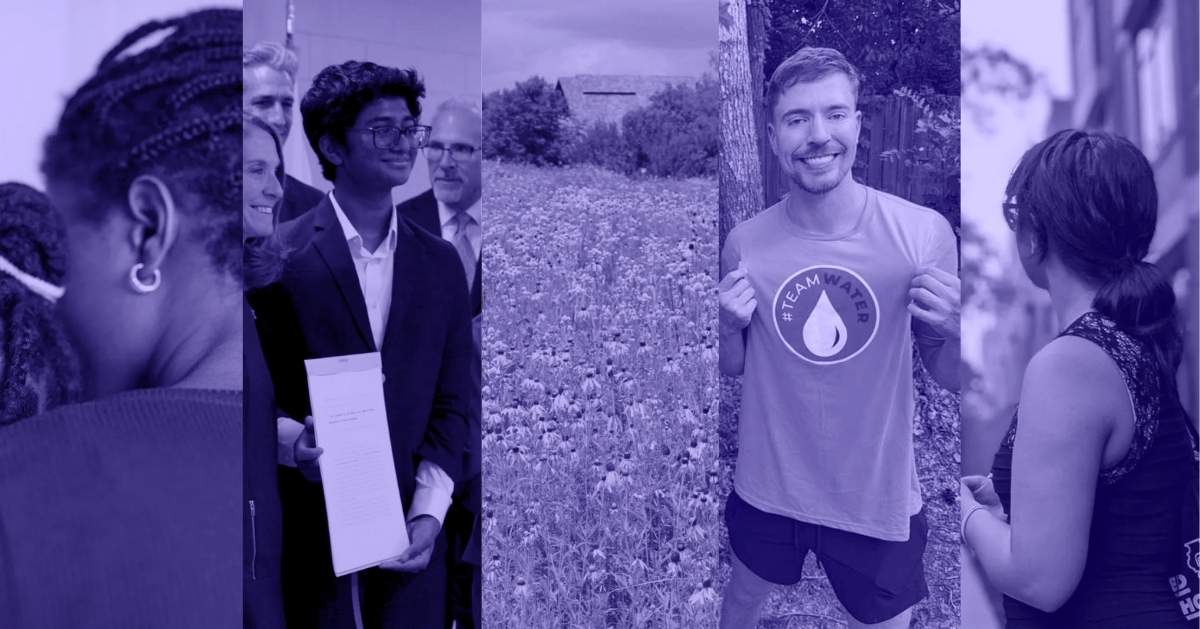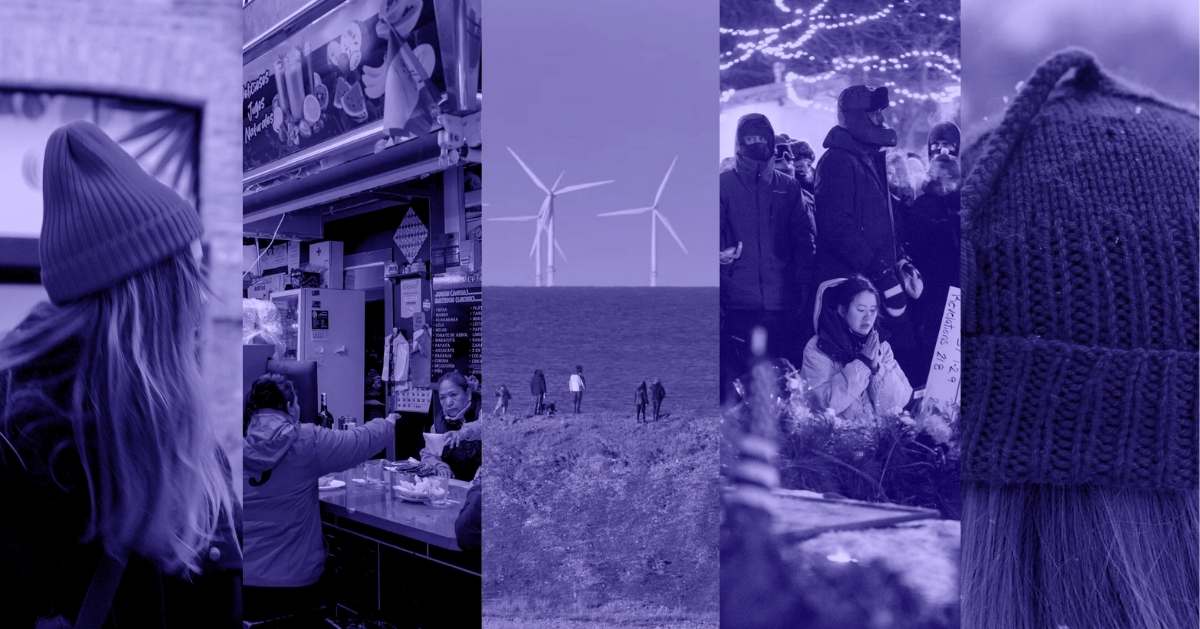Every day the Good Good Good team collects the best good news in the world and shares it with our community. Here are the highlights for this week!
If you want to get good news in your inbox every day, join the Goodnewsletter — the free daily newsletter designed to leave you feeling hopeful.
The Best Positive News We’re Celebrating This Week —
YouTubers MrBeast and Mark Rober launched the “biggest water campaign in history” to bring clean water to 2 million people
On the heels of two successful crowdfunding campaigns — #TeamTrees, which raised $20 million to plant 20 million trees in 2019; and #TeamSeas, which raised $30 million to remove 30 million pounds of plastic waste from oceans in 2021 — Donaldson and Rober have taken on a new cause: access to clean water.
Bringing together “more than 3,000 of your favorite creators,” the duo is aiming to raise $40 million to bring safe, clean drinking water to 2 million people around the world. The fundraiser kicked off with a $500,000 donation from Shopify, and YouTube is matching the first $2 million raised.
The fundraiser will support the nonprofit WaterAid, which provides clean water, hygiene systems, and dignified toilets to people in need across the globe, with programs in 22 countries.
Why is this good news? While access to clean water and sanitation is already a major and urgent global health issue, climate change is making things worse, with more extreme droughts drying up and floods contaminating water sources.
New study: Strengthening collective labor rights can help reduce economic inequality
→ Read more
After California expanded its paid family leave benefits, more people started using them
A new state law went into effect in January that increased paid family leave payments for parents in California. As a result, claims were up about 16% in the first half of 2025 compared to the same time period last year.
Before the expansion, most workers could receive up to 60% of their income when they took time off to care for a new baby. Now, workers making less than $63,000 a year can get up to 90% of their pay, and workers making more than that can get 70%.
The new legislation was to allow more families to take leave, especially low-income workers, and that seems to have worked. Claims for people making under $60,000 were up 17%.
→ Read more
A guaranteed income program helps formerly incarcerated parents find stability and rebuild relationships with their children
At the onset of the COVID-19 pandemic, the Center for Employment Opportunities’ Returning Citizens Stimulus program provided more than 10,000 formerly incarcerated people across 28 cities with monthly payments of up to $2,570.
Five years later, an assessment showed that even temporary, short-term cash assistance payments can lead to benefits like reducing parole violations, which often lead to reincarceration.
The program was particularly beneficial for parents: with recipients saying it helped them take the steps needed (like finding a home) to reconnect with their children after they were released.
Why is this good news? An estimated 80% of incarcerated women are mothers, and about 58% of them have children under 18 years old. Because of the cost of prison and jail phone calls, and challenges with in-person visits (women are incarcerated an average of more than 2 hours’ driving distance from their families), staying connected while incarcerated is difficult.
While that also needs to change, providing this kind of support upon release helps families reconnect and helps end recidivism.
→ Read more
Local bookseller donates proceeds of Republican senator’s book to immigrants: ‘We stand with our community’
→ Read more
Students in Denver are transforming a school lawn into a sustainable landscape that will dramatically reduce water use
The Neighborhood Resilience Corps’ Summer Climate Adaptation Academy is a summer program that provides both climate science education and hands-on experience in learning sustainable landscaping techniques.
And instead of sleeping in this summer, 13 teenagers from a local high school converted 2,500 square feet of Kentucky bluegrass into a “water-wise” landscape that includes 70 drought-tolerant plants.
This landscaping approach reduces water consumption by about 60% compared to traditional grass lawns, and trees help cool the surrounding area by up to 10 degrees.
Missouri is building a nearly 300-mile-long butterfly trail to attract monarchs and tourism
Passing through 12 counties in western Missouri, the state is building a 26-mile-wide, 292-mile-long corridor in what will become the Highway 13 Butterfly Trail.
The initiative is focused both on pollinator conservation, particularly for monarch butterflies, and on helping boost local economies by creating plantings and tourist attractions.
Led by a community alliance, the trail will feature gardens, art installations, educational centers, and research facilities.
Why is this good news? The monarch butterfly is proposed to be listed as a threatened species under the Endangered Species Act, and initiatives like this will help conserve and revive local populations.
It’s also good for business: a report found that nearly 25% of tourists to the state visit for outdoor activities, including ecotourism. Good for people, good for the planet.
→ Read more
This abandoned office building was transformed into a floating bookstore — and you’ll never want to leave
The IEA says renewable energy sources will overtake coal to be the world’s top power source ‘by 2026 at the latest’
Driven by the exponential growth of wind and solar power, the International Energy Agency is now predicting that renewable energy sources will officially overtake coal and become the top source of electricity by 2026 — if not sooner.
Depending on weather-related impacts on output, renewables could surpass coal as soon as this year.
Wind and solar together are projected to make up 17% of the share of global electricity generation this year, up from 1% in 2005 and 4% in 2015.
→ Read more
Illinois is the first U.S. state to provide free mental health screenings for students in 3rd through 12th grade
A new law in Illinois will require all public schools to offer third- through 12th-grade students a free, optional mental health screening once a year. Similar to vision or hearing screenings, the assessment will help “provide early identification and intervention” so students “can get help they need as soon as possible.”
One high school student, 17-year-old Abhinav Anne, had long been advocating for the law to prioritize and support students’ mental health after experiencing a crisis of his own.
The screenings will begin next school year, and the state’s Board of Education has one year to provide schools with guidance and policy on how to use the screening tools.
Why is this good news? Students deserve to have mental health support before they reach the point of a crisis — early detection and intervention tools like mental health screenings help do that. And now, the state of Illinois is making them even more accessible.
→ Read more
LA contest challenges 350 designers to create cutting-edge affordable housing — and the winners will actually be built
→ Read more
A Los Angeles librarian brings books and resources to unhoused people on Skid Row
Local libraries have it all — but only one has Amanda Mellor, an adult librarian at Los Angeles Public Library who doubles as the Persons Experiencing Homelessness Outreach Librarian. In this role, she goes out into the community and “connects people who are experiencing homelessness, or other life instabilities, with library resources.”
Whether that’s signing up for a library card or developing on-site programs for those more hesitant to visit the library in person, Mellor’s outreach approach brings the library’s resources to them.
And her work is being recognized nationally. Earlier this year, she was named to the Library Journal’s 2025 “Movers & Shakers” list, which honors 50 librarians who serve as advocates, community builders, educators, and innovators across the country’s library systems.
→ Read more
A student-run birth control delivery network was banned on campus, but members found a way to keep helping
DePaul University in Chicago has long banned the distribution of birth control on campus. But a group of students, the “Womb Service,” has kept up a contraceptive delivery network for classmates at off-campus locations for the past three years.
Their service confidentially provides students with supplies like condoms, emergency contraception, pregnancy tests, and more. They receive about 25 orders a week. They also host mini education sessions about sexual health and wellness — something group members quickly realized a lot of people did not have.
Recently, the university revoked its status as a student organization, meaning they couldn’t meet or advertise on campus, making it more difficult to reach people who need the resources they provide — both education and contraception — and recruit more people to help, but they’re committed to continuing to support students.
Why is this good news? Everyone deserves access to reproductive health care, and that includes contraception. College-age students are the most vulnerable to unintended pregnancy, which can prevent them from completing their degree — derailing their entire life, especially for those from lower-income families.
A colorful affordable housing complex looks like it came straight from a Wes Anderson movie
In what’s perhaps the biggest animal welfare victory of the 21st century, global fur production has collapsed
In 2014, more than 140 million minks, foxes, and other animals around the world were farmed and killed for their fur. Just a decade later, that number dropped dramatically to 20.5 million.
Pressure on major fashion brands to stop selling fur and on lawmakers to ban the production and sale of fur were instrumental in bringing about this rapid decline. It also demonstrates a shift in public perception of owning or wearing fur products.
While there are other animal welfare concerns that remain, largely in meat production, the decline of fur production reminds us that progress is possible.
→ Read more (Note: May require login)
More good news of the week —
A team of dentists provides free care for hundreds of homeless patients every year — with a new grant, they’ll help even more. In addition to the pain and lack of confidence that come from tooth loss, without access to dental care, people can also lose the ability to eat solid food, may suffer from pain and chronic disease caused by poor dental health, and others may struggle to find work.
Online bookselling platform Bookshop.org saw 65% growth in the first six months of 2025. The Amazon alternative now works with 2,471 independent booksellers, distributing 10% of all non-affiliate profits to them twice a year. In July, each eligible bookstore partner received at least $744.27.
A Kentucky public library is hosting a free supply store to provide gently used items to help teachers prepare for the new school year. Teachers can not only browse gently-used classroom and art supplies, chapter books, and more, but they can also use a large poster printer, Cricut machine, sticker printer, 3D printer, heat press, and more at two library branches.
A Sri Lankan court ordered the owners of a shipping container to pay $1 billion in marine pollution compensation. A Singapore-flagged container ship, which was carrying chemicals, sank near Sri Lanka’s capital in 2021, causing the most severe marine environmental catastrophe in the country’s history.
Ethiopia launched a national tree-planting campaign to plant 700 million trees in a single day. While it wasn’t possible to verify if they’d achieved their goal — part of a larger conservation effort to plant 50 billion trees by 2026 — around 6 a.m. local time, 355 million seedlings had already been planted by 14.9 million Ethiopians.
Volunteers in South Carolina are building and installing hundreds of manufactured reefs to restore Kiawah Island’s coastline. One of the area’s “most critical ecosystems,” the watershed marsh provides a buffer to storm surges and increased tides, a habitat for marine life, and water filtration.
Thanks to lower speed limits and smarter design, the capital of Finland went an entire year without a single traffic death. Street design for pedestrian and cycling infrastructure has been significantly upgraded in recent years, as well as cooperation with traffic police has intensified and more traffic cameras and automated enforcement systems have been introduced.
A way to give back to the community and serve a greater purpose, a restaurant in Texas has given away 15,000 free meals. Korea House in North Austin has been around for nearly 40 years, and since 2023, has provided a free meal to anyone who walks through its doors on the first Wednesday of every month.
The Long Beach Public Library is opening its e-book library so teens from other states can read banned books. In 2024, the American Library Association recorded challenges to 2,452 different books across the country, with the majority of those challenges coming from organized movements, many targeting sexual or LGBTQ+ content.
To help mitigate the rising cost of living, Australia wiped more than $10 billion in student loan debt for 3 million people. Under the plan, student loans would be reduced by one-fifth, meaning university graduates with an average loan of A$27,600 would have A$5,520 wiped, helping “take a weight” off the backs of young people in the country.
To tackle record-breaking levels of infections, the U.K. is rolling out gonorrhea vaccines in sexual health clinics across the country. The NHS predicts its world-first rollout could prevent as many as 100,000 cases and potentially save it nearly £8m over the next decade.
A soccer team in Vermont is the first in the U.S. to make climate action a central tenet of its business plan. Vermont Green FC’s approach is inspired by that of England’s Forest Green Rovers, which in 2018 became the first U.N.-certified carbon-neutral football club.
The Gates Foundation pledged $2.5 billion to “ignored, underfunded” women’s health. One of the largest recent commitments as part of Bill Gates’ plan to give away his fortune by 2045, this funding will address long-neglected conditions like endometriosis and menopause, fund research, product development, and equitable access globally.
As more people aged 45-49 are getting screened for colon cancer, more early stage diagnoses are being made. The recommended age to begin colorectal screening was lowered from 50 to 45 by the American Cancer Society, and earlier detection means it’s very likely to be curable.
Nigeria seized more than 1,600 exotic birds in one of the biggest wildlife trafficking busts in years. Nigerian customs said an investigation to find those responsible for the illicit cargo is ongoing, and that the birds will be handed to the National Parks Service for rehabilitation and release into the wild.
Volunteers are helping reunite people with items lost in the Texas floods. First responders, volunteers, and good Samaritans have spread out across the region to help reunite Texans with the cherished belongings, family heirlooms, and everyday household knick-knacks.
A Taiwanese company is building a “vacuum cleaner for the ocean” that uses AI to detect and remove plastic waste. CircularBlue is a marine debris cleanup initiative that’s “designed to intercept and process ocean waste along coastlines, the areas where 80% of this trash ends up.”
A philanthropist gave 500 free bikes to youth in Milwaukee to help them bike to school and around their community. Eric “Shake” James realized there was a lack of bikes in Milwaukee’s underserved communities, so he launched an annual bike giveaway called “Black on the Block” — every year, the number of bikes he’s given away has increased by 100.
Ghana launched an AMBER alert system to help locate missing or abducted children. The system was launched in collaboration with Meta, which will display all the necessary information about the missing child, like a photo description, location of the abduction, and other relevant and available information to aid in immediately identifying the missing child.
Italy’s constitutional court ruled that a nonbiological mother in a same-sex union is entitled to parental leave. The second ruling in as many months celebrated by LGBTQ+ activists, the court said that the child’s interest in having time with both parents, as well as the parents’ responsibilities, didn’t depend on their sexual orientation.



